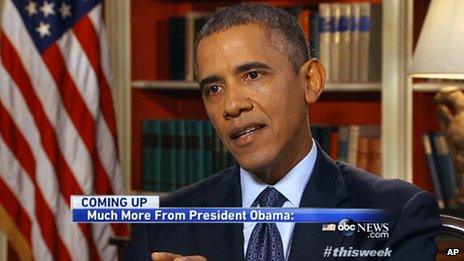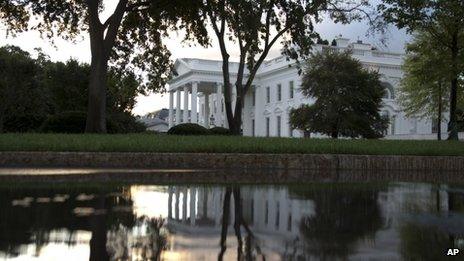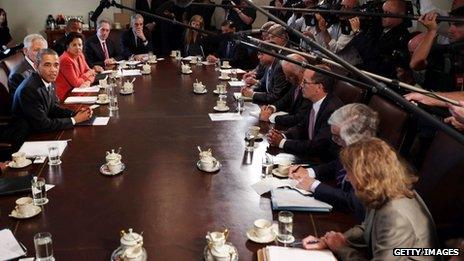President Obama's roller-coaster Syrian gamble
- Published

Syrian rebels have expressed disdain for President Obama after he backed away from military action over alleged chemical weapons attacks
The last few weeks have been a roller-coaster ride as President Obama's tactical approach to the Syrian dilemma twisted first one way, then another.
As the hair-raising ride seemingly slows down, he has not lost. He may even have won.
Through a series of highly unlikely gambles, he has come close to getting what he wanted.
The Syrians have promised to get rid of chemical weapons, and it looks highly likely it was American threats that pushed them to a deal. But no military action has been taken.
There is a serious plan in place, and the Syrians say they will comply.
Reduced footprint
If they do not, the Russians say they will back a UN Security Council resolution that could allow the use of force.

For now the US-Russia deal looks like a minor miracle, won against all the odds
Everyone, except the rebels, is claiming a measure of victory.
But getting here was not glorious and that in itself will have consequences.
One price, according to The Observer's Peter Beaumont, is President Putin's re-invention of Russian relevance, external.
That leaves some - such as The Daily Telegraph's Janet Daley, external - spluttering, but it is a logical outcome of Obama's approach.
The outcome also shines a light on something more profoundly important than one conflict in one region of the world.
It is clear that Mr Obama wants America to reduce its footprint in the world - no boots on the ground, or on the neck of regimes disobedient to American will.
It is clear he wants to work, when he can, through the international system.
He acknowledges the importance of the rise of the rest - particularly China.
Logic dictates all of this means the US will be one voice among many.
Perhaps the loudest, perhaps the most vocal, but not the sole voice.
Considerable feat
Importantly, it will not be a harmonious chorus - different voices will say different things, some extremely uncomfortable for the West.

A sense of crisis at the White House has diminished as a result of the Syria deal
That is disturbing to those think it is imperative that the world follows America's lead. But it could reinvigorate the United Nations.
For now, the deal looks like a minor miracle, won against all the odds.
It is no wonder the president found time for a round of golf at the weekend, on one of those Washington days so cool it heralds autumn, even though it is actually hotter than many British summers.
He could afford to relax, just a little. Just before he headed to the course, he had spoken to John Kerry to congratulate him on the deal with the Russians.
The last few weeks have in many ways seemed the worst of Obama's presidency - but he has managed to pull off the considerable feat of appearing weak and incapable of making decisions, while at the same time being found guilty of making bold and questionable ones.
He has seemed almost torn apart by conflicting instincts.
On the one hand, he obviously wanted to avoid high-profile military action in the Middle East. But on the other, he could not allow his threats about red lines and chemical weapons to prove hollow.
Potential pitfalls
In a piece for the Today programme on Saturday, I wrote that the last 10 days had seriously damaged the president.

The president is eager to reduce America's footprint in the world
I also said that in a year's time he may look like the smartest man in the room. Perhaps that moment has come a little sooner.
True, there are lots of potential pitfalls ahead.
The Syrians could give the world the run-around.
Defining non-compliance could be hard. Getting a UN resolution to condemn it could be harder.
Congress could still be a problem if Obama did want to take action.
If that happened, Obama could slither down the snake back to square one, without the prospect of a Russian ladder to help him back up.
Even if it all goes smoothly, not everyone will be happy.
Not the opposition who were hoping for a hammer blow against President Bashar al-Assad of Syria.
Not hawks in Washington, external who wanted the same and do not trust the deal.
And not those who think the whole episode highlights a muddle-headed Middle East policy, external.
The president got here by delay, not by design. I suppose the history books may show there was a cunning plan all along, but I doubt it.
It reminds me of the old story, variously described as Persian, Russian, or Middle Eastern, about the man sentenced to death by a tyrannical monarch.
He tells the king that if he calls off the execution, he will teach the monarch's horse to sing. Just give him a year.
The king grants his plea. Fellow prisoners are astounded - how on earth does he think he can teach the horse to sing?
He replies he has bought himself a year - "the king may die, I may die, the horse might die - the horse might actually learn to sing".
It seems as if Obama's horse is at least making strangled noises that might save it from history's chopping block.